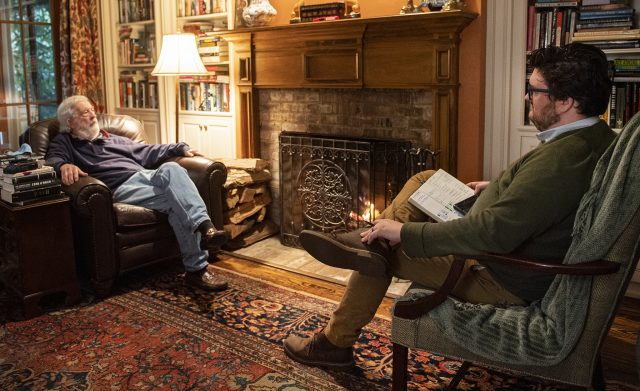
JB Clark (right) interviews Curtis Wilkie at the legendary journalist’s home in Oxford. Photo by Logan Kirkland/Ole Miss Digital Imaging Services
Writing the University of Mississippi‘s definitive retirement profile on Curtis Wilkie was the kind of responsibility I wasn’t sure I wanted, but it’s become a memory I will share for years to come.
When I arrived at Wilkie’s Oxford home with university photographer Logan Kirkland, we were bummed that rain might hamper our plans to record the interview on his back porch. Professor Wilkie instead walked us to a room in the back of his house where he was keeping a fire going. Each surface held a stack of new releases and Southern classics, even though the walls were floor-to-ceiling bookshelves.
We sat in comfortable old leather chairs – 10 feet apart to prevent the transmission of any airborne droplets – and picked up where we left off the last time we spoke.
The moment the assignment switched from an anxiety-riddled responsibility to a bucket-list experience was when, two hours into our interview, professor Wilkie said to stop worrying about the time because he was having fun. I was having fun, too. Logan had packed his camera and lights a half-hour before and was sitting cross-legged on the floor next to our chairs.
When I first got the assignment, I sat down with my editor and made a list of people we wanted to ask about his career. It was rich with award-winning writers from Mississippi – a Pulitzer Prize winner and a Pulitzer Prize judge.
During our interview professor Wilkie said, “Do you mind talking to an old pal of mine who I’ve been in a book club with for years? He was my commanding officer in ROTC at Ole Miss.” It turned out to be longtime Ole Miss Chancellor Robert Khayat. Of course I wouldn’t mind talking to Robert Khayat.
Each of the people on that list has served as a mentor to me over the years – whether in person or from a distance – and here they are talking about the influence of this one man on their own lives and careers. It’s like discovering all your favorite bands have the same favorite band.
And, like each of the people I interviewed, I had an opportunity to get to learn from Wilkie personally. He will never know the impact he’s had on me as a writer, as a reader, as a Mississippian and an American, as a person and as a graduate of the University of Mississippi. His voice is one I hear in my head almost daily, reminding me to get the lede out of the bottom of my story or to ask better questions.
If you blow up a photo of any of the biggest moments, from the 1960s to the 2000s, Wilkie is the newspaper version of Waldo, tucked away behind some outsized character.
His greatest skill as a journalist and storyteller was his ability to know where to be and his ability to know when to shut up and let the people around him tell their story. He could get even the most controversial characters to walk him through the steps they took to arrive at their position, something we could use more of these days.
As he regaled Logan and me with stories of the South or of covering revolutions across the globe, I was reminded why I love his writing. He has a boyish sparkle in his eyes when he remembers one of those especially difficult characters or comical stories from his past, especially if it serves to make a point in the present.
That boyish sparkle translates to the pages because he has managed to continue asking the questions that most of us have grown too apathetic or jaded to ask.
It injects a level of humanity into his journalism that has always been rare in the national scene. There are no talking heads in a Curtis Wilkie story, only human beings.
Everyone I talked to reminded me of Wilkie’s ability to be in a room with anyone, no matter how much they disagree. There is no doubt in my mind that he has been an agent of change in Ole Miss, in Mississippi and in the world. He’s a reminder that we’ve come a long way, and we must keep moving forward.
Sitting in the home of a legend in my profession reminded me that those of us who have had the opportunity to be in Oxford and at Ole Miss with Curtis Wilkie have breathed rare air. For that, I am forever grateful.
JB Clark is a communications specialist within the Department of Marketing and Communications at the University of Mississippi. He’s a 2010 graduate of the university’s School of Journalism and New Media.